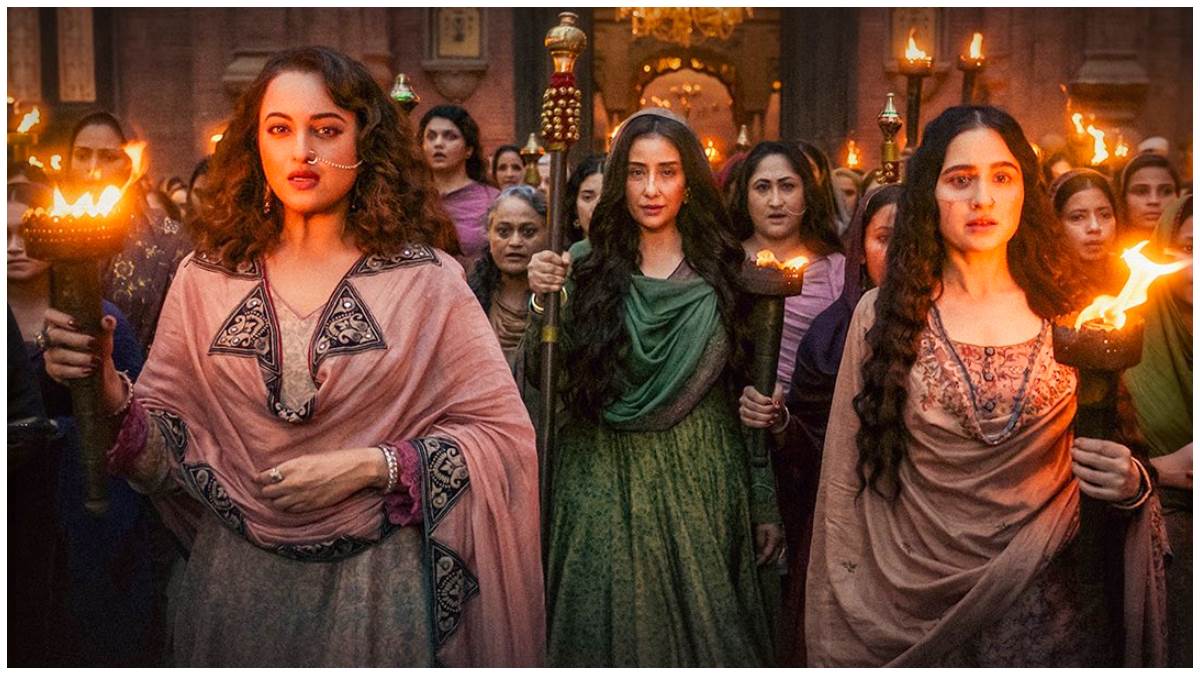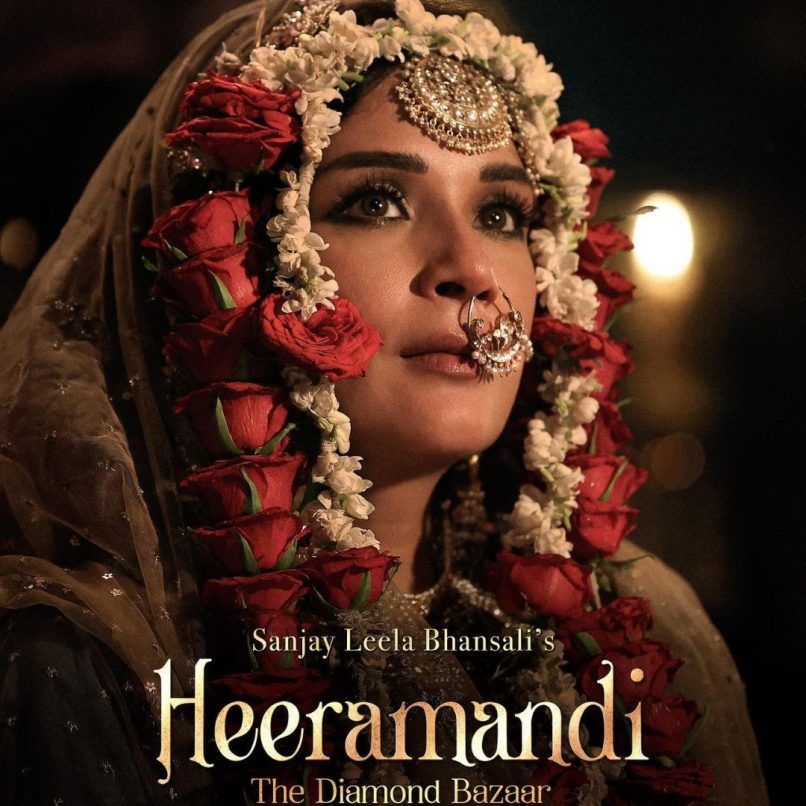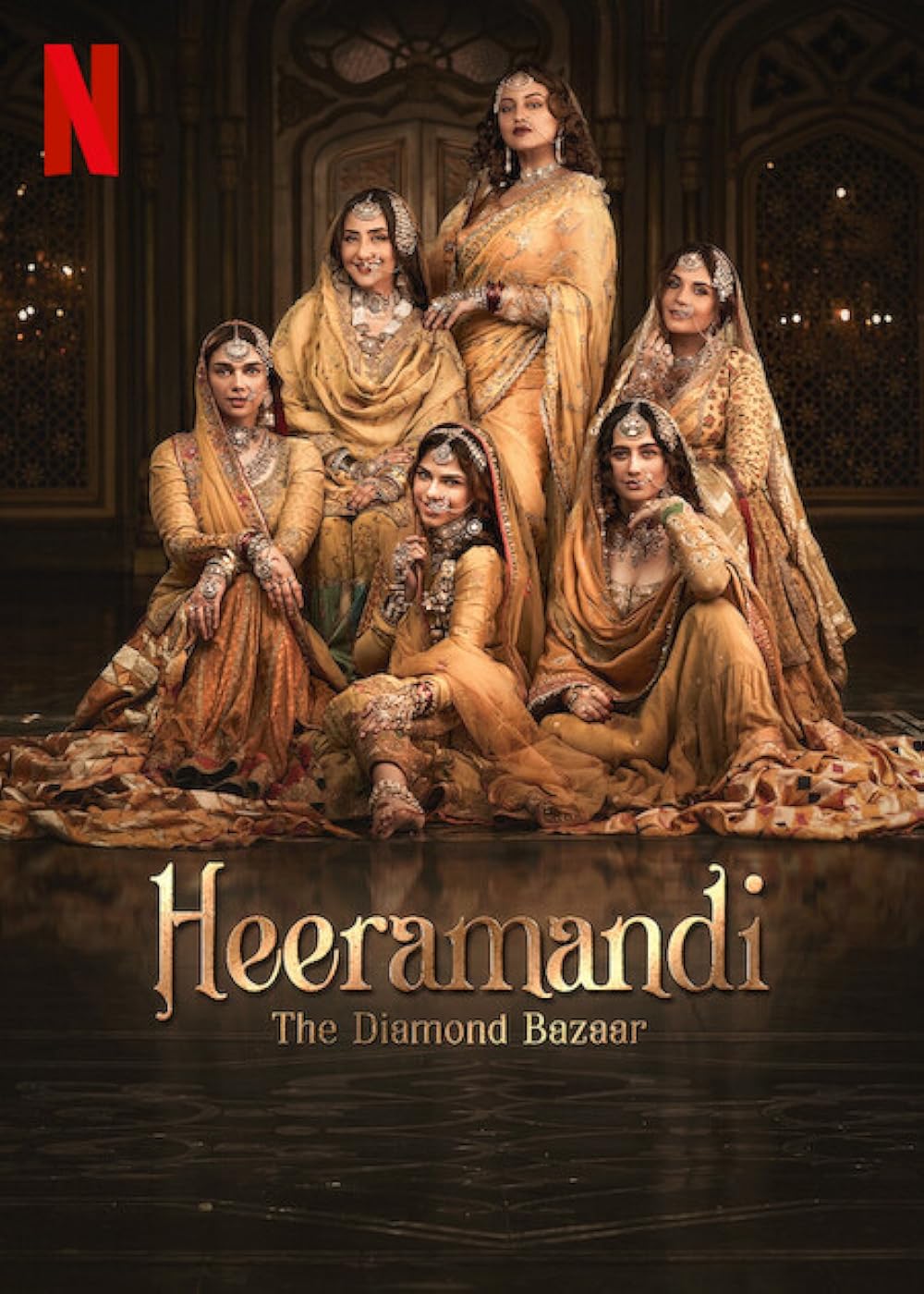‘Hum sone ke pinjare mein fadfadate rehte hain aur khwaab azadi ke dekhte hain’ (‘We flutter in a gilded cage and dream of freedom’), says Bibbojaan one of the six leading ladies in the Netflix series Heeramandi.
Each woman in this diamond bazaar seeks a different kind of freedom, a yearning shaped by their dreams and desires.
These are the tawaifs (courtesans), timeless muses for the celebrated filmmaker Sanjay Leela Bhansali. These are also caged birds longing for freedom while singing and dancing, seducing and entertaining their qadrdaans (patrons). Each woman in this diamond bazaar seeks a different kind of freedom, a yearning shaped by their dreams and desires.
Mallikajaan’s freedom is ruthless
In this glittering spectacle of extravagance, Maillikajaan is easily the most captivating gem. She is the towering, menacing, and unflinching brothel madame played by Manisha Koirala, with beauty and barbarity in equal measures. She holds the reins of kotha politics in her hand and she is also weighed down by the responsibility of it all.
Standing tall as the metallic figure, she searches for the successor of her throne so that she can pass on the baggage and feel free. Her freedom means the trap for someone else but morality is none of her concern. And she will do whatever it takes to secure her legacy even if it ultimately means crowning her biggest enemy.
Lajjo is free in death
Lajjo aka Lajwanti, played by an unforgettable Richa Chadha, is the adopted daughter of Mallikajaan. Her story is a learning lesson for the devastating consequences of unrequited love. She is an alcoholic yearning lover in denial; a prisoner of her own despairs and delusions as much as the walls of Heeramandi. She dreams of escaping through love but is distraught when her lover violates and humiliates her as she performs at his wedding ceremony where he marries “a respectable girl.”
She still spins and swirls to finish her performance even as she is crying her heart out. There is so much pain in her eyes that it feels like a sin to watch her. Unable to make peace with the heartbreak, she drinks poison in her alcohol and finds freedom, albeit a tragic one.
Bibbojaan’s azaadi is political
Aditi Rao Hydari plays the elder daughter of Mallikajaan who disguises herself as a seductress but is a patriot at heart, to quietly work for the freedom of her nation. At a congregation of courtesans, she appeals to all the women in a resolute voice – ‘Ek baar mujre wali nahin mulk wali ban kar socho’ (‘For once, think as a citizen and not a courtesan’). Slowly with time, the curtains are raised and it is revealed that her every move was made to gather intel on the British officers and give it to a group of freedom fighters. Even the money earned from her performances goes towards the cause of liberation.
Bibbojaan’s unwavering dedication to the rebellion leads her to embrace imprisonment, demonstrating that her fight for freedom transcends her own desires. Her story echoes the struggles for agency and self-determination that many women face even today.
From the self to the nation: Fareedan’ idea of freedom changes
Fareedan enters Heeramandi with only one purpose – to take revenge on Mallikajaan for killing her mother and take back what is rightfully hers no matter what it takes. She is a woman haunted by her bloodied childhood but would not stop at any cost. She is vicious, manipulative, and devilish all while looking drop-dead gorgeous. Her evil hatred is so strong and pure that in one scene when a nawab recounts her criminal records to Mallikajaan, she admits ‘alas, my daughters have none of this talent’.
But through a series of eye-opening events, she realises the futility of seeking revenge which won’t change anything, especially for her. By choosing to join the fight for India’s independence, Fareedan aligns herself with a cause greater than herself, mirroring the ongoing fight for social justice.
Waheeda’s yearns to break free from her physical and emotional scar
Waheeda was scarred in her youth physically and emotionally. The mark on her face deprived her of men, money, and power and it is this power whose attainment becomes her pursuit for freedom. She is perenially broken but held together by a promise of becoming the owner of a Kotha one day. She is betrayed, but hopeful, greedy and vengeful. Her ambitions outshine her shortcomings in beauty. The hurt storming inside her is way more powerful than the forces trying to make her stray from her path to becoming a madame herself.
Waheeda was scarred in her youth physically and emotionally. The mark on her face deprived her of men, money, and power and it is this power whose attainment becomes her pursuit for freedom.
She is battered again and again; firstly, after her own daughter takes her patron away; secondly, when Bibbojaan also takes away a British office for whom she was performing; and again when Fareedan turns her back from Waheeda. One can’t help but feel sorry for the injustices she had to bear. Her fight for power within the confines of Heeramandi reflects the broader struggles faced by women in patriarchal societies, where worth is often measured by beauty and social standing.
Alamzeb longs to choose her future
When everyone around her is fighting for power or position, Alamzeb chooses to rebel. Alamzeb is the younger daughter of Mallikajaan who is yet to debut as a courtesan. But she refuses to submit to the inescapable circumstances in front of her. With her quiet courage and defiance, she protests against the destiny reserved for her by her mother. She reads, writes, eats and drinks poetry, day and night.
She daydreams of becoming a poet one day. And most of all, she dares to love. She travels miles and miles, risking her life and her mother’s reputation to be with her lover. Like Lajjo, she believes in the freedom of love but it comes at a cost. Her pursuit of love outside the societal norms reflects the fight for individual choice and freedom of expression that resonates with young women today.
Heeramandi showcases the complexities of its setting, reminding us that the fight for freedom is a universal human struggle. These women, trapped within the confines of societal expectations, break free in ways both subtle and spectacular.
From Mallikajaan’s determined will to Bibbojaan’s rebellious nature, each character reminds us that freedom comes in many forms.
From Mallikajaan’s determined will to Bibbojaan’s rebellious nature, each character reminds us that freedom comes in many forms. While some, like Lajjo, find peace in the end, others, like Fareedan, discover freedom in a cause greater than themselves. Heeramandi is a testament to the human desire, forever yearning to break free from the constraints that bind us.
About the author(s)
Aaditya Pandey is a poet and freelance writer based in New Delhi. He writes about art, culture, politics and queerness. His previous works have been published in Deccan Chronicle, Live Wire and Poems India








